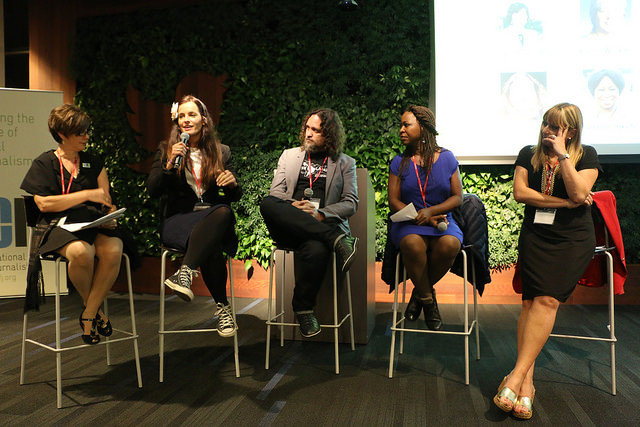
Digital journalists share how they are transforming the role of women in media during ICFJ panel
Leaders in global media innovation gathered for a panel discussion on transforming the role of women in journalist at Twitter’s San Francisco headquarters Tuesday. Pictured: Joyce Barnathan (president of ICFJ and moderator), Mariana Santos (speaking), Justin Arenstein, Vivienne Irikefe and Sandra Crucianelli. Credit: Carolina Wilson.
Lack of training, lack of networks and lack of capital. Women in media face these three barriers and the International Center for Journalists (ICFJ) is working to overcome them.
For its first major West Coast event, ICFJ, whose work Knight Foundation supports, assembled a panel of global media innovators at Twitter’s San Francisco headquarters Tuesday evening, spurring discussion about the importance of supporting a new generation of women as leaders in media technology. Each panelist brought a unique cultural and professional background in media innovation to the discussion. They have worked on projects from developing an app to track Ebola in Nigeria to creating the first team of investigative journalists who can track government accountability in Argentina.
Over the past 30 years, ICFJ has worked with over 80,000 journalists from 180 countries in an effort to empower global citizens with networks and tools to improve media outreach in their communities.
“Our goal is really to have an impact,” said Joyce Barnathan, president of ICFJ, which recently. “We use the technology for coverage that improves policies and enhances transparency and basically empowers people to make better decisions in their lives.”
Despite the fact that men still lead most of the top U.S. news organizations, Barnathan says the pipeline to careers in journalism is dramatically changing, with women making up two-thirds of all journalism undergraduate and graduate students in U.S. universities.
From a more global perspective, the situation seems bleaker. Barnathan said fewer women even have an opportunity to grow into a leadership positions in news media in developing countries.
One way to encourage women to become media leaders is through mentorship. And mentorship is at the core of panelist Mariana Santos’ organization, Chicas Poderosas (Powerful Women).
Santos is a John S. Knight Journalism Fellow at Stanford University and the director of interactive and animation at Fusion. When she was an ICFJ Knight International Journalism Fellow, she launched Chicas Poderosas, which brings female journalists together with designers and developers to create digital stories. The Knight fellowships are ICFJ’s leading program.
Panelist Sandra Crucianelli, a data journalist expert, did similar work during her ICFJ fellowship at La Nación, Argentina’s leading newspaper. Crucianelli stressed “the importance of inspiration in storytelling,” saying that many women journalists are inspired by other female mentors.
“They learn how to build a story, with their heroes side by side. It’s not just about learning tools and process; it’s about changing the chip,” Santos said. “In Latin American women, the mindset is ‘I can’t. This is for boys that know a lot of code.’ But actually, we can.”
Similar to Santos’ meetups, which bring together journalists and coders, are boot camps happening across Africa thanks to panelist Justin Arenstein.
Arenstein, also an ICFJ Knight International Journalism Fellow, launched a $1 million African News Innovation Challenge—the continent’s first-of-its kind contest, backed by Knight Foundation, to promote digital media innovation. Arenstein founded the Code for Africa movement, including coding teams in five African countries. Sixty percent of those teams are women.
But, Arenstein says the barrier for females to succeed in a journalism career is financial. The moment a woman in African begins to succeed within a media organization, she’s taken out of the newsroom and shunted into a management position in the corporate sector, often offered three to four times her initial media salary.
“In Africa, to be able to earn a living wage, you have to stop becoming a journalist and you start becoming a people manager,” Arenstein said.
Vivienne Irikefe—another panelist from Africa—refused to follow that track. A science and health correspondent for TVC News in Nigeria, Irikefe won first place in ICFJ’s Hala Nigeria story contest by designing a crowd-sourced app to track Ebola.
“People in the West are far ahead of us,” Irikefe said. “And we want to catch up so that we’re not left behind.”
Carolina Wilson is a Bay Area freelance writer.
This post has been updated to reflect that Justin Arenstein has organized coding boot camps in several African countries.
Recent Content
-
Journalismarticle ·
-
Journalismarticle ·
-
Journalismarticle ·


